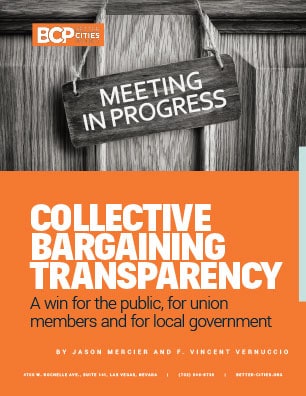
A new Better Cities Project report shows how opening up the negotiations behind those expenditures is good for taxpayers, good for union members and good for local government.
The cost to municipalities of the COVID-19 pandemic and subsequent lockdowns are placing every part of local budgets into the spotlight. Government employee wages and benefits are not immune as they have an extraordinary impact in virtually every city. A 2018 National League of Cities survey found that wage hikes impacted 88% of surveyed city budgets, more than any other factor listed. These costs are often set years at a time through collective bargaining contracts with employee unions. And while they may not be renegotiable in the short-term, opening up those negotiations to public scrutiny is good for taxpayers, good for union members and good for local government.
As we detail in our latest release , creating additional transparency in collective bargaining negotiations is:
Good for taxpayers: Since government-employee contracts account for such a large portion of public spending, they should not be negotiated in secret. Taxpayers provide the money for these agreements and they should be able to follow the process, holding government officials accountable for the spending decisions they make.
Good for union members: Because they know exactly what proposals their union representatives are requesting and rejecting, transparency benefits rank-and-file union members, providing information on how they are being represented.
Good for local government: Transparency instills more accountability into the collective bargaining process by quickly identifying whether one side is being unreasonable in negotiations or acting in bad faith. This clarity correlates with higher levels of trust in government, an important factor as local officials tackle a range of challenges requiring voter buy-in.
The people in your community have a right to know how public spending decisions are made on their behalf. If for no other reason, transparency increases public confidence in the efficacy of government institutions. Opening union contract negotiations to the public as other states and cities have done, is a practical and ethical way to achieve that standard.









What Missouri can learn from Kansas’s budget crisis